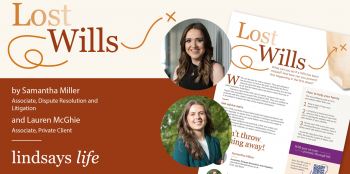In the age of social media and online reviewing platforms, consumers have never had greater freedom to share their experiences and express their views on the products and services they use. That freedom can, however, be a double-edged sword where the right to share an opinion and the reach afforded by social media and other online platforms can exponentially increase the potential impact of one person’s ‘opinion’.
The real-world implications of sharing opinions online were recently demonstrated in a decision by the High Court in England in Summerfield Browne Limited (SB”) v Philip James Waymouth.
The case
SBL, a firm of solicitors, raised court proceedings against the defendant in connection with a review posted online via the popular reviewing platform, Trustpilot. The defendant had engaged SBL to provide legal advice for a relatively modest fixed fee. The defendant was dissatisfied with the services provided to him and left a scathing review online in which he described the services as “a total waste of money” and referred to SBL as “another scam solicitor”. SBL asked the defendant to remove the review. The defendant refused to do so unless he was refunded the fees paid to SBL.
SBL declined the defendant’s offer and instead decided to raise an action for defamation, seeking damages totalling in excess of £25,000. In answering the claim, the defendant put forward a defence framed on the grounds of honest opinion, public interest and truth. SBL succeeded in striking out the defences of honest opinion and public interest.
In his judgment (following Wasserman v Freilich), the judge found in favour of SBL’s position that the defamatory statements in the defendant’s review amounted to assertions of fact and, including in this instance, allegations of dishonesty and fraud.
Grounds for defence
The broad principle for which the Court found favour is, in essence, that an allegation of dishonesty is a matter of fact per se and cannot be converted into a matter of opinion merely by prefixing the relevant statement of fact with words such as “I believe…”. In this instance, the defendant having (in the view of the Court) made a statement of fact, it was not open to him to lead a defence of honest opinion.
In relation to public interest, the defendant’s position was held by the Court to be undermined by: (a) his seeking payment in the form of refund in exchange for removing the review; and (b) his failure to engage in SBL’s complaint’s process.
Finally, in relation to the defence of truth (or veritas in Scots law), the Court found against the defendant summarily on the basis he had offered no credible basis for his assertions and in light of evidence led by SBL to the contrary.
The decision
The defences having failed, the Court ultimately found in favour of SBL and awarded damages in the sum of £25,000. In doing so, the Court referenced the fact Trust Pilot describes itself as "The world's most powerful review platform, free and open to all" and held:
“it is beyond any dispute that the words complained of had a clear tendency to put people off dealing with the Claimant firm. It is difficult to conclude that the Defendant had any other purpose in mind when posting his review. It is a serious matter to accuse a solicitors firm of dishonesty and any such allegation is likely to deter those who are unfamiliar with the firm from using its services.”
The decision serves as a stark reminder of the potential consequences of putting one’s opinion out into the world whether by social media or other online platforms. The potential reach of such platforms cuts both ways and can result in substantial damages awards where the impact of defamatory statements can be readily measured in contemporary metrics, such as, views, likes, shares and hits.
Legal reform is forthcoming
In the context of Scots law, it is widely considered the current common law is largely outdated, in particular, in the age of social media – which did not exist when much of the caselaw was decided. However, the law is due to be reformed in the Defamation and Malicious Publication (Scotland) Bill introduced in late 2019 and now entering the stage 2 amendment phase of the parliamentary process. The Bill, when introduced, will hopefully bring clarity to Scots law and how it applies in the modern context.
If you require advice in connection with any of the topics raised in this article, please contact our dispute resolution team.






